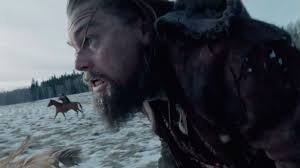Michael Punke (2002) The Revenant
Posted by celticman on Sun, 23 Oct 2016

Underneath the title on the cover, in brackets, is a dictionary definition of what The Revenant means (n. one who has returned from the dead). Every actor after every new release must also return from the dead. Leonardo Di Caprio banked another $20 million, and got the added bonus of an Oscar as Best Actor playing the part of frontiersman Hugh Glass, a man that just wouldn’t lie down and die. This is a novel of derring-do, with a lot of daring and a lot of do.
September 1, 1823
They were abandoning him. The wounded man knew it when he looked at the boy, who looked down, then away, unwilling to hold his gaze.
There are familiar names and locations. For example, The Rocky Mountains and Fort on the Bighorn. That’s a river, but most folk will be familiar with it as the place where General Custard and American Calvary honed the practice of genocide and were wiped out by massed Indian tribes. But this is long before this when there were no maps, but frontiers filled with Indians, with savages. Around six million buffalo still roamed the plains. Yellowstone wasn’t a park. Punke provides a map on the first pages and time moves back and forward with Hugh Glass and where X marks the spot of the Grizzly attack that minces his body, crudely scalps him and almost tore his head off near the Grande River.
The path of Captain Henry of the Rocky Mountain Fur Company is mapped alongside the path of Glass. Both were frontiersmen. Henry’s title was an affectation (as most titles are) as he led a ragtag of men into the wilderness to trap plentiful game and bring valuable furs back to St Louis to sell. There was money in them there Black hills, but also Indian tribes warring with each other and the trickle of white men that moved through their territory. Punke leads us gently into their backstories. Winners and losers.
Hugh Glass, first mate and gun running and rum running in the war of Independence with England. Captain of his own ship. Sunk, as he was prone to be. His fiancée and intended dies, but he doesn’t know this until later because he’s been forced to become a pirate sailing under the flag of the Pirate Jean Lafitte. When he escapes—in the nick of time—as is the case with most adventure stories, and finds himself wandering across vast stretches of Mexican Texas, Pawnee Indians plan to make a barbecue of his carcass, but he pulls a conjuring trick and survives. Hugh Glass always survives even though he might lose his hair now and again to passing Grizzlies. On the map is marked the First Arikara attack and then hundreds of miles North, on the North Platter River, the Second Arikara attack. Fling in the hundreds of miles Glass crawled, yomped, canoed, and covered by horseback and you’ve got a survival story worth telling.
But this isn’t just a survival story. This is a story of morality. Hugh Glass rages like a Grizzly and wants more than his pound of flesh from the boy and man that left him and been paid to stay with him until the end and bury his body. Instead they robbed him of his powder, rifle, flint and knife all the tools that could keep him alive in the wilderness and left him to his fate.
Hugh Glass began to crawl.
Jim Bridger, the boy had at least tried to make Glass comfortable before he left. He was the less culpable of the two. Glass follows Fitzgerald hundreds of miles to Fort Atkinson. He’s a sociopathic figure, dragooned into the US army for stabbing a fellow gambler at Fort Atkinson, which was build the river for ease of access and a military presence trying to drive a wedge into the wilderness for commerce. None of these things interest Glass, he wants his rifle back and he intends to use it on Fitzgerald. It’s a hair-trigger denouement, but the book (and I imagine the film) is the righting of all wrongs (well, apart from genocide and millions of bison) and a story of human endurance. But a word of warning, do not under any circumstances hang about with anybody called Hugh Glass or, friend or foe, there’s not a revenant of a chance, you’ll end badly.
https://www.amazon.co.uk/Lily-Poole-Jack-ODonnell/dp/1783522356
- celticman's blog
- Log in to post comments
- 1003 reads



Comments
The fight with the bear was
The fight with the bear was good. Also the bit where Leonardo gets inside the horse's innards. Ah the days of the bold brave wild frontier.
I though Innaritu's earlier movie Birdman was better. Also I could identify with it more as it had more female roles.